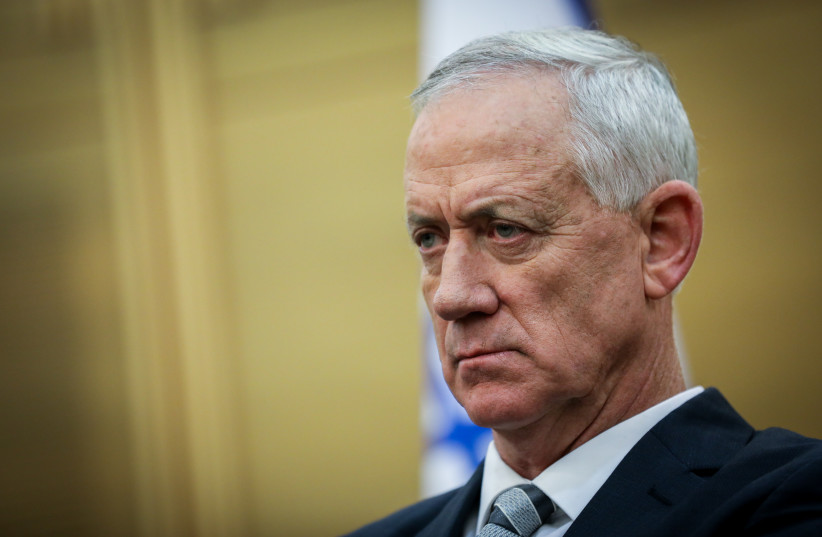Talk of striking Iran has returned to center stage after Israeli Defense Minister Benny Gantz made the point, as quoted in The Jerusalem Post, that Israel is capable of striking Iran. But the country’s leadership must carefully weigh this step before deciding to take it, he added. The newspaper referred elsewhere to remarks by Likud MK Tzachi Hanegbi.
In it, he said that party leader Benjamin Netanyahu, who will lead the new Israeli government upon his return to power, could order an attack on Iran’s nuclear facilities if no nuclear agreement is reached and the United States cannot take action against Tehran. Gantz’s talk of capabilities, readiness, and preparing the necessary plans is a reaffirmation.
That is, Israel, sensing the great danger posed by the Iranian threat, has certainly prepared what it considers necessary in terms of operational capabilities, as well as the necessary plans for a military strike against Iranian nuclear facilities. These are all operational planning issues in such cases. There are numerous points inferred from Gantz’s and Hanegbi’s statements.
What did Gantz and Hanegbi mean about Israel and striking Iran?
First of all, Gantz, who is preparing to leave the Defense Ministry, is presenting something of an inventory before his people and history. He wanted to reaffirm the IDF’s readiness to attack Iran during his tenure. At the same time, he made a point of emphasizing that the decision would have to be carefully examined on a political level before it could be made, a very important position.

The MK also spoke of the possibility that Netanyahu would order an attack on Iran, not straying far from Gantz’s statements about sensitivity on the issue. Indeed, it depends on two important conditions. The first is the failure to reach a nuclear agreement with Iran.
That is very likely. The second is the inability of the US to take action against Tehran.
This is an elusive condition because, as I said in an earlier article, it necessarily means coordinating with Washington and getting the green light from the Americans before an Israeli military strike against Iran can take place and it has to do with Washington’s own admission that all of its options have dried up to counter the Iranian threat certainly unlikely.
So overall, the decision is a political decision par excellence. By political here I mean a careful consideration of the possible consequences of the decision in all its aspects, whether or not it succeeds in achieving its objectives.
Both possibilities imply the same consequences, which may differ only in their severity, magnitude and potential scope, especially given the state of liquidity and chaos that currently marks international relations, and Iran’s heavy involvement in the Ukraine crisis, along with all the implications that this implies for Russia’s position, at least in terms of logistical and intelligence support to its Iranian ally.
As analysts, we agree that the option of attacking Iran is not so simple. As Gantz said, careful thought is needed before implementation, especially since the defense minister’s statement indicates that the question is not only about military and operational capabilities but also about examining the potential consequences of the decision and the ability to deal with them.
In the same remarks, Gantz argued that Netanyahu had almost implemented an attack scenario against Iran in the past. But in the end, he backed down. I believe that the circumstances and conditions of decision-making are more complex today than in the past.
IRAN IS more capable of responding militarily to an Israeli attack. This is not to overstate Iranian capabilities.
But we have to be quite realistic about recent breakthroughs in Iran’s military capabilities, whether it is the drones that Russia has used in the war in Ukraine or the continuing disclosure of new weapons, most recently hypersonic missiles. These may be in the early stages of development.
But we need to look at least a little bit at the potential implications of technological cooperation between Iran and allies with sophisticated defense industries like Russia. Is it too late for Israel to deal with the Iranian threat? The answer is a resounding no.
A “yes” is tantamount to capitulation to the status quo. This is not an option for Israeli or any other leadership.
But it is necessary to diversify the alternatives and options to anticipate the intricacies of the strike scenario, given the complexity of the US position internationally, because of the pressures it is under, whether due to the rise of China and the status of Taiwan or the crisis in Ukraine, the outcome of which is hard to predict.
All of this makes it tricky for Washington, regardless of who is in charge in the White House, to give Israel a clean slate for a military strike against Iran. Some might say, why shouldn’t Israel rely on itself to make such a decision? The answer is that a unilateral decision here is both delicate and dangerous.
It is not a matter of a strike that may or may not succeed, followed by a political response.
But it is primarily about the scenarios of the Iranian response and how to deal with it, with this complex web of agents, militias, and sectarian arms funded and directed by Iran. This makes managing the response an idea that may be beyond the means of any country, not just Israel, with existing geopolitical and geostrategic calculations, which in turn requires a network of supporting regional and international alliances.
There is no doubt that Iran is on the verge of becoming a hard piece on the Middle East chessboard. This worries not only Israel but also most countries in the region. Iran has always sought to leverage its military power into strategic influence.
Basically, it is an expansionist hegemony. Therefore, the danger of increasing its power is not limited to Israel, and it should not think about it alone.
The writer is a UAE political analyst and former Federal National Council candidate.
